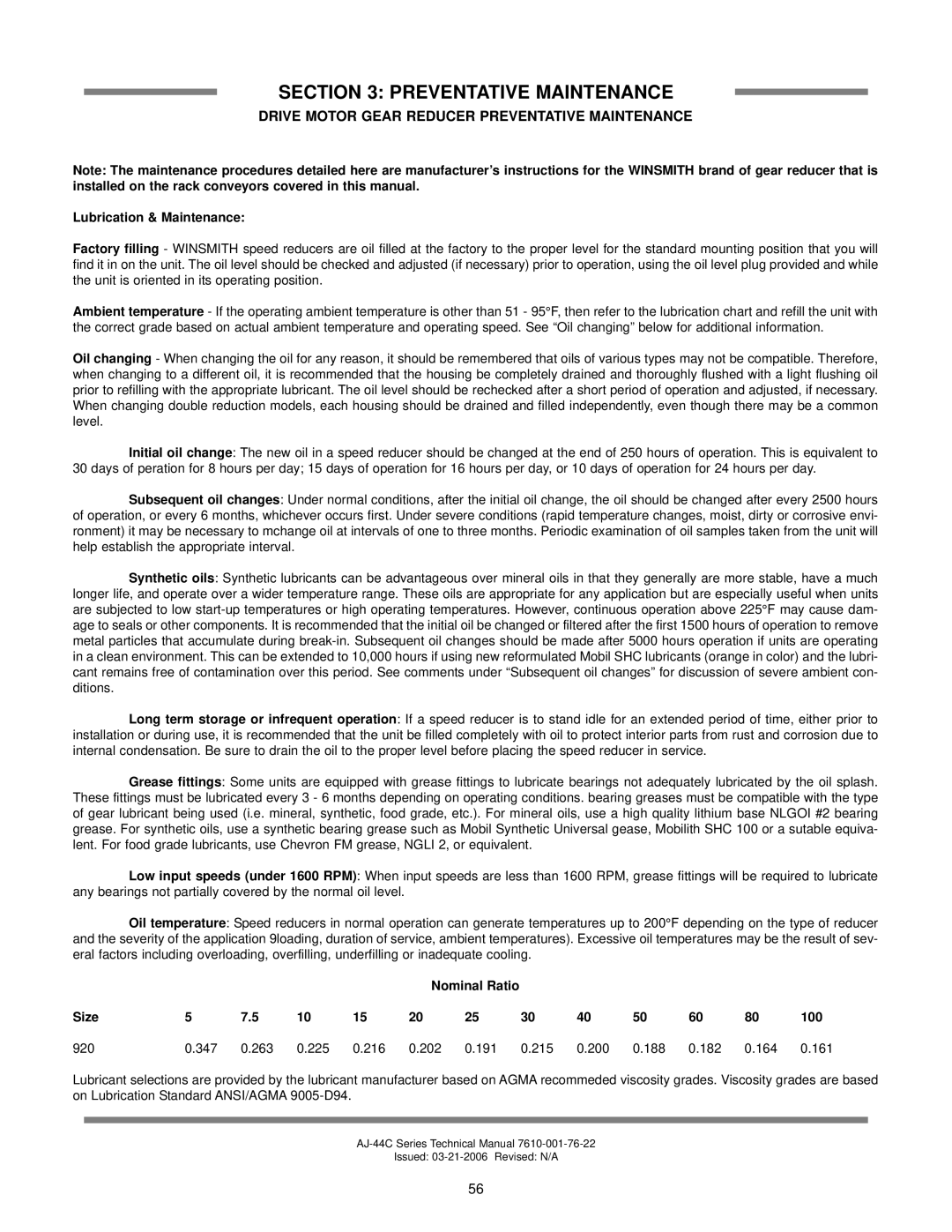
SECTION 3: PREVENTATIVE MAINTENANCE
DRIVE MOTOR GEAR REDUCER PREVENTATIVE MAINTENANCE
Note: The maintenance procedures detailed here are manufacturer’s instructions for the WINSMITH brand of gear reducer that is installed on the rack conveyors covered in this manual.
Lubrication & Maintenance:
Factory filling - WINSMITH speed reducers are oil filled at the factory to the proper level for the standard mounting position that you will find it in on the unit. The oil level should be checked and adjusted (if necessary) prior to operation, using the oil level plug provided and while the unit is oriented in its operating position.
Ambient temperature - If the operating ambient temperature is other than 51 - 95°F, then refer to the lubrication chart and refill the unit with the correct grade based on actual ambient temperature and operating speed. See “Oil changing” below for additional information.
Oil changing - When changing the oil for any reason, it should be remembered that oils of various types may not be compatible. Therefore, when changing to a different oil, it is recommended that the housing be completely drained and thoroughly flushed with a light flushing oil prior to refilling with the appropriate lubricant. The oil level should be rechecked after a short period of operation and adjusted, if necessary. When changing double reduction models, each housing should be drained and filled independently, even though there may be a common level.
Initial oil change: The new oil in a speed reducer should be changed at the end of 250 hours of operation. This is equivalent to 30 days of peration for 8 hours per day; 15 days of operation for 16 hours per day, or 10 days of operation for 24 hours per day.
Subsequent oil changes: Under normal conditions, after the initial oil change, the oil should be changed after every 2500 hours of operation, or every 6 months, whichever occurs first. Under severe conditions (rapid temperature changes, moist, dirty or corrosive envi- ronment) it may be necessary to mchange oil at intervals of one to three months. Periodic examination of oil samples taken from the unit will help establish the appropriate interval.
Synthetic oils: Synthetic lubricants can be advantageous over mineral oils in that they generally are more stable, have a much longer life, and operate over a wider temperature range. These oils are appropriate for any application but are especially useful when units are subjected to low
Long term storage or infrequent operation: If a speed reducer is to stand idle for an extended period of time, either prior to installation or during use, it is recommended that the unit be filled completely with oil to protect interior parts from rust and corrosion due to internal condensation. Be sure to drain the oil to the proper level before placing the speed reducer in service.
Grease fittings: Some units are equipped with grease fittings to lubricate bearings not adequately lubricated by the oil splash. These fittings must be lubricated every 3 - 6 months depending on operating conditions. bearing greases must be compatible with the type of gear lubricant being used (i.e. mineral, synthetic, food grade, etc.). For mineral oils, use a high quality lithium base NLGOI #2 bearing grease. For synthetic oils, use a synthetic bearing grease such as Mobil Synthetic Universal gease, Mobilith SHC 100 or a sutable equiva- lent. For food grade lubricants, use Chevron FM grease, NGLI 2, or equivalent.
Low input speeds (under 1600 RPM): When input speeds are less than 1600 RPM, grease fittings will be required to lubricate any bearings not partially covered by the normal oil level.
Oil temperature: Speed reducers in normal operation can generate temperatures up to 200°F depending on the type of reducer and the severity of the application 9loading, duration of service, ambient temperatures). Excessive oil temperatures may be the result of sev- eral factors including overloading, overfilling, underfilling or inadequate cooling.
|
|
|
|
| Nominal Ratio |
|
|
|
|
|
| |
Size | 5 | 7.5 | 10 | 15 | 20 | 25 | 30 | 40 | 50 | 60 | 80 | 100 |
920 | 0.347 | 0.263 | 0.225 | 0.216 | 0.202 | 0.191 | 0.215 | 0.200 | 0.188 | 0.182 | 0.164 | 0.161 |
Lubricant selections are provided by the lubricant manufacturer based on AGMA recommeded viscosity grades. Viscosity grades are based on Lubrication Standard ANSI/AGMA
Issued:
56
